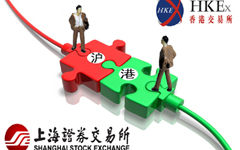The program will permit trades such as short selling by overseas investors, reports Oswald Chan in Hong Kong.
The Shanghai and Shenzhen exchanges were allowed to offer short selling and margin trading starting in March 2010 as they sought to deepen and diversify investor participation. Now, investors from Hong Kong and overseas markets will be able to follow these practices in Shanghai as well, with some conditions.
|
 |
| Shanghai-HK Stock Connect: All you need to know |
|
 |
| 'Through train' set to green-light new system |
At the start, the Shanghai-Hong Kong Stock Connect program will allow trading of 266 Hong Kong-listed companies and 568 Shanghai-listed A shares.
The initial quota is 300 billion yuan ($48.9 billion), or 13 billion yuan a day, for A-share trading by Hong Kong and overseas investors, both retail and institutional.
Another quota of 250 billion yuan, or 10.5 billion yuan a day, is for trading of Hong Kong shares by mainland institutions and retail investors who have more than 500,000 yuan in their securities accounts.
Hong Kong Exchanges and Clearing Ltd, which runs the Hong Kong exchange, said on Sept 26 that covered short-selling and margin trading will be allowed on northbound trading.
For short-selling, investors can borrow Shanghai-listed shares that are already eligible for this practice and sell them on the Shanghai Stock Exchange. There are several restrictions on this practice. There are daily quantity limits. The Shanghai exchange will be able to suspend short-selling if volumes become too high.
For margin trading, currently mainland investors can only do this for certain A shares. Under the Stock Connect program, Hong Kong and overseas investors will face similar restrictions. Haitong International Securities Group Ltd has estimated that about 400 issues will be eligible for margin trading.
"Initially, supply will be the main problem in lending shares to our clients," said Wilson Hui, executive director of Haitong International Securities.
Patrick Shum, Tangard Fund Management's investment manager, told China Daily that allowing short-selling and margin trading through Stock Connect will promote reform of the mainland equity market.
"Margin trading as a speculative activity is needed in the stock market because it can boost liquidity. Short-selling as a hedging tool is also needed because when short-sellers need to cover their positions through buying back shares, this creates a market rebound that can correct the market's direction," Shum said.
"In the long run, all these factors will benefit the development of the mainland A-share market."
The mainland market is still dominated by retail investors, who generally know little about short-selling and margin trading. Permitting these practices by investors from outside the mainland can help boost liquidity and stabilize the equity market, analysts said.
According to Citibank estimates, domestic retail investors account for more than 80 percent of the volume on the mainland market, while overseas investors account for less than 1 percent.
